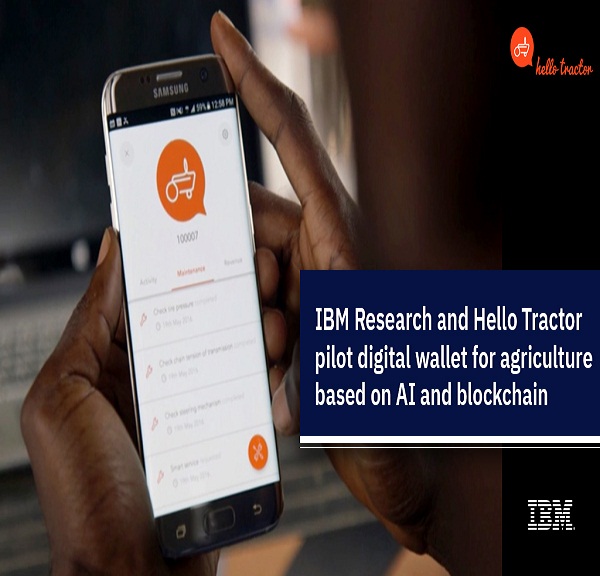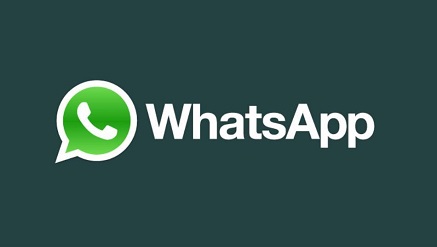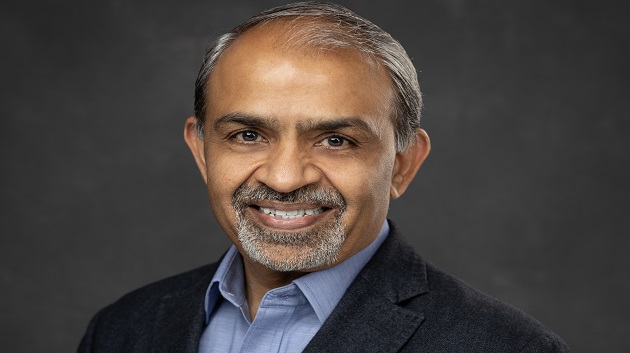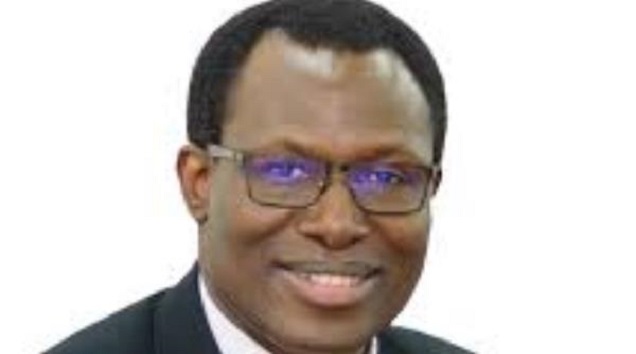Telecom
IBM Research, Hello Tractor Unveil Digital Wallet For Agriculture Based on AI and Blockchain

IBM Research Scientists and start-up Hello Tractor are piloting an agriculture digital wallet and decision-making tool which provides demand and supply visibility for farmers, tractor fleet providers and banks to give farmers the equipment and technology they need to build a sustainable farm.
This technology was unveiled on Tuesday at TechCrunch Startup Battlefield Africa 2018.
In Sub Sahara Africa more than 60% of farms are powered by humans, with less than 20% provided by engines, a model which is not sustainable as food demand increases due population growth, which is averaging 11 million per year.
In addition, according to the Food and Agriculture Organization 35-50% post-harvest losses for perishable agricultural products are lost annually in the region due to poor planting practices.

To address this, in 2014 Hello Tractor launched a mobile platform to enable farmers to access tractor services on demand.
Using a mobile app, the service aggregates tractor service requests (e.g., ploughing) and then pairs them with recommended tractors and operators, while simultaneously tracking how many hours each piece of equipment is in the field and area serviced.
Jehiel Oliver, CEO and Founder, Hello Tractor said “Through valued relationships with companies like John Deere, we’ve been very successful in increasing mechanization access in small holder communities.
“To reach the next level, we need to add additional services including predictive fleet utilization and maintenance; operator and tractor scoring; financing and the crop yield forecasting.”
To achieve this, Hello Tractor turned to IBM’s research lab in Nairobi, Kenya. Scientists at the lab are working with Hello Tractor’s developers to apply several technologies, including the Watson Decision Platform for Agriculture, Blockchain, IoT and cloud, to bring new services to the app for tractor owners and dealers, farmers and banks.

The new services will be tested in a pilot starting in the first half of 2019.
More specifically,
- Farmers: machine learning will help to predict crop yields, which combined with advanced analytics and the blockchain, can be mined to develop a credit score for loans. Forecasted weather data from The Weather Company, an IBM business; remote sensing data (e.g., satellite); and IoT data from tractors will also be incorporated into the app to help small holder farmers know when to cultivate, the quality of their farm cultivation, what to plant, and the appropriate fertilizer using remoting sensing and IoT data. In the future, the IBM AgroPad technology, developed at IBM’s lab in Brazil, could also be incorporated to determine soil quality.
- Tractor Fleet Owners: using machine learning and IoT owners will be able to view and manage fleet utilization, predictive maintenance and forecast future tractor utilizations based on history, real-time weather and remote sensing satellite data. Using a five-star rating system, tractor operators will be ranked and utilized based on their training (e.g., ploughing, deep ripping, harrow, fertilizing). Owners will also have financing opportunities, for maintenance and for buying new tractors and implements using historical data.
- Tractor Dealers: can benefit from improved tractor repair and servicing, after sales support, spare part inventory planning and credit administration.
- Banks and Financial Institutions: can view and track utilization of tractors to determine a credit portfolio for the farmer and tractor owner, while also evaluating forecasted utilization to make credit decisions for tractor owners based on verified and trusted data on the blockchain.
- Governments: can utilize data and actionable insights for various decision support capabilities such as for structuring incentives, enforcing regulations prioritizing investments and policy decisions.
The backbone of the agriculture digital wallet is a blockchain-enabled and AI-based decision support platform, which enables capturing, tracking, and instant sharing of data, while creating end-to-end trust and transparency for all the parties involved across the agribusiness value chain.
“Our vision is to leverage AI, blockchain and the Internet of Things to digitize, optimize, and streamline agricultural business processes to create efficiencies and new services from farm-to-fork around the world,” said Dr. Solomon Assefa, Vice President, Emerging Market Solutions and Director, IBM Research – Africa.

For the next phase of the project, IBM researchers and Hello Tractor engineers are looking to use machine learning with image recognition to predict the quality of cultivation. For example, remote sensing data combined with weather data could be used to predict the next harvest. Plans are also underway to expand the platform beyond Nigeria to Kenya, Mozambique, Senegal, Tanzania, Pakistan, and Bangladesh.
Hello Tractor is focused on improving smallholder farmer’s access to timely and affordable tractor services along with other farm inputs.
Our technology makes it easy and profitable for tractor owners to monetize tractors as business assets and connect with farmers to schedule tractor services.
Hello Tractor’s innovative use of IoT (the Internet of Things) simplifies complex data to ensure transparency, profitability, and accountability across our ecosystem of farmers, tractor owners, tractor dealers, original equipment manufacturers, banks, and governments.
Telecom
WhatsApp to Start Showing more Adverts in Messaging App

WhatsApp is launching three new ad features in a global roll-out across the messaging app.

The Meta-owned platform said the new ads will not be shown in the same place as people’s private chats, nor will the contents of their messages – which are encrypted – be used to decide which ads to display.
WhatsApp will instead use the country, city and language of the user, as well as how they interact with other ads and which channels they follow, to drive suggested content.
But people who have chosen to link their WhatsApp account to Facebook or Instagram will see more personalised ads.
The new ad features will appear in a section called Updates, which is a separate tab at the bottom of the app.
WhatsApp claims to have 1.5 billion users globally.
Businesses with channels will be able to choose to promote ads in the Updates section to attract new followers, and also charge a subscription to access extra content.
WhatsApp will eventually take a 10% commission of that fee, and there may also be extra costs on top of that taken at the app store level depending on the size of the business.
Firms will also be able to advertise in the form of a status update, which looks similar to an Instagram story and will link through to start a chat if clicked on.
Social media expert Matt Navarra told reporter that Meta is “laying the foundation for WhatsApp to finally become a monetisable platform at scale”.
But “monetising the periphery” of WhatsApp, while keeping personal chats private, would not be without risk for the company, he added.
This could particularly be the case in markets like the UK and Europe, he said, where the app is viewed primarily as a messaging tool with less appetite for content feeds or adverts.
“Any perception that the app is becoming noisy or Facebook-ified will spark backlash,” he said.
How does WhatsApp make money?
‘Natural extension’
It’s no coincidence that the new features bring WhatsApp more in line with Meta’s other platforms Facebook and Instagram.
“Obviously there’s overlap,” said WhatsApp boss Will Cathcart.
“We have stories on Instagram and stories on WhatsApp, and we now have a way for businesses to promote themselves in both, and we think that’s a good thing.”
He said he believed the move was a “natural extension of messaging services” and not dissimilar to features of rival apps such as Snapchat and Telegram.
For Mr Navarra, it also reflects a wider shift in the social media landscape.
“The feed is dying, public sharing is down, people are retreating into DMs and Stories in small groups,” he said.
“Meta’s trying to turn WhatsApp into a platform without users realising it and if they move too fast or it starts to feel like another ad network, people might disengage or maybe worse, distrust the app.”
Telecom
Airtel Africa Reinforces Commitment to ESG Impact while Advancing Digital, Financial Inclusion Across 14 Markets

Airtel Africa, a provider of telecommunications and mobile money services across 14 African countries, has published its Sustainability Report 2025, reaffirming its corporate purpose of transforming lives by expanding access to essential digital services, supporting inclusive economic growth, and advancing environmental stewardship throughout its operations.

In 2024/25, Airtel Africa made significant progress in bridging the digital divide, advancing financial inclusion and supporting underserved communities through strategic investment in connectivity, people, and sustainable practices.
Airtel Africa’s chief executive officer Sunil Taldar said: “This year’s achievements, from connecting 2,176 schools through the UNICEF partnership to reaching 44.6 million Airtel Money customers with near-gender parity, prove that the power of technology is a catalyst for gender balance. At Airtel Africa, we believe to not only expanding networks but we’re also building bridges to education, financial security and sustainable growth for Africa’s next generation.”
Key ESG highlights:
- Providing underserved communities with access to reliable network and connectivity:
- 2% population coverage across 14 markets (up from 80.4% in 2023/24)
- 36,159 4G infrastructure sites, including more than 15,300 in rural areas.
- Continued investment of $670m in network expansion and modernisation to boost speed, coverage and capacity.
Airtel Africa is connecting the unconnected, giving millions access to voice, data and mobile money services – driving economic opportunity and enhancing access to essential services.
- Bridging the digital divide, driving financial inclusion and addressing gender inequality
- 4 million data customers (+14.1% vs 2023/24)
- 6 million Airtel Money customers (+17.3%), with 44.2% Airtel Money customers who are women (+6.2% vs 2023/24)
- 7 million Airtel Money agents in our distribution network (+23.4% vs 2023/24)
- 2% women in the workforce across the Group (up from 28.3% vs 2023/24)
Through inclusive digital services and affordable financial products, Airtel Africa is empowering individuals and communities, particularly women, to fully participate in the digital economy.
- Unlocking potential through education and employment opportunities
- 2,176 schools connected to the internet free of charge (up from 1,201 in 2023/24)
By providing free connectivity and online resources to schools, Airtel Africa is helping young people reach their full potential. A growing agent network also supports employment and entrepreneurship opportunities across its footprint.
- Minimising the impact of our operations on the environment
- 500 off-grid sites converted to on-grid power, reducing reliance on diesel generators.
- 93% of total waste recycled (+3% vs 2023/24)
Airtel Africa is committed to reducing the impact of its operations on the environment through investment in renewable energy solutions and responsible waste management.
The Sustainability Report 2025 adheres to the Global Reporting Initiative (GRI) and GSMA telecommunications industry standards.
Telecom
ALTON Clarifies on Migration to End-User Billing for USSD Services

The Association of Licensed Telecom Operators of Nigeria (ALTON) wishes to inform the public and all mobile subscribers that the migration to the End-User Billing (EUB) model for Unstructured Supplementary Service Data (USSD) services will take effect from Wednesday, 18th June 2025.

This transition marks a significant milestone in the evolution of Nigeria’s digital financial ecosystem and is being implemented per the Determination of USSD Pricing and Services issued by the Nigerian Communications Commission (NCC).
The Determination was developed in collaboration with the Central Bank of Nigeria (CBN) and other key stakeholders to ensure a sustainable, transparent, and customer-friendly framework for USSD service delivery.
USSD services play a vital role in expanding access to financial services, particularly for unbanked and underbanked populations. However, the previous corporate billing model—where banks were billed by telecom operators—led to prolonged disputes over unpaid charges, service interruptions, and uncertainty for customers.
To address these challenges, the NCC’s 2025 Determination introduced the End-User Billing model, which allows mobile network operators to charge customers directly for USSD sessions.
To achieve the implementation of the EUB model, the CBN and NCC have stipulated that only banks that meet certain regulatory and operational conditions are permitted to migrate. One of which is the notification to customers of the billing change in advance, and to ensure that customers are fully aware of the new airtime-based charges and how they will be applied.
Accordingly, under the new billing model, USSD charges will be deducted directly from the customer’s airtime balance, not from their bank account, and each USSD session will attract a charge of ₦6.98 per 120 seconds. To enjoy the service, customers will receive a prompt to opt in and approve the charge before any deduction is made, and there will be no double billing as billing will only occur for successful sessions via airtime deductions.
ALTON wishes to reiterate that this change does not affect the availability or functionality of USSD banking services, as customers can continue to use their bank’s USSD codes as usual, provided they have sufficient airtime.
To ensure a smooth transition, ALTON advises customers to follow these support guidelines:
–For access issues (e.g., inability to dial USSD codes), contact your mobile network operator.
– For transaction-related issues (e.g., failed transfers or service errors), contact your bank’s customer service.
– Both banks and mobile network operators are required to provide responsive support and mensure that customers can access and use USSD services without disruption.
Alternative digital banking channels such as mobile apps, internet banking, and ATMs remain fully operational and available for customer convenience.
ALTON reiterates its commitment to working closely with the NCC, CBN, financial institutions, and other stakeholders to ensure that this transition is seamless, equitable, and beneficial to all parties, especially the end users.
We remain dedicated to promoting transparency, operational efficiency, and consumer protection across Nigeria’s telecommunications and digital finance sectors.

 News3 days ago
News3 days agoWhy I am vying for AFRINIC board seat in 2025 election – Terry Edet

 Telecom2 days ago
Telecom2 days agoGSMA, Mobile Industry Call for Strengthened Action to Advance Child Online Protection in Africa

 E-Financial3 days ago
E-Financial3 days agoFidelity Bank ED, Kevin Ugwuoke takes over as President of Risk Managers Association

 Telecom3 days ago
Telecom3 days agoCrypto Exchange MEXC Rolls Out P2P Support for Naira, Birr, and Rupee

 News1 day ago
News1 day agoDigital Africa Global Consult, NDPC Partner on Ground-Breaking “Nigeria Data Challenge” Initiative

 General News2 days ago
General News2 days agoTD Africa, HP Strengthen Partnership to Advance Africa’s Tech Ecosystem

 General News3 days ago
General News3 days agoAirtel Concludes Nationwide Environment Week with Market Clean-Up by Employees

 Telecom16 hours ago
Telecom16 hours agoALTON Clarifies on Migration to End-User Billing for USSD Services



























